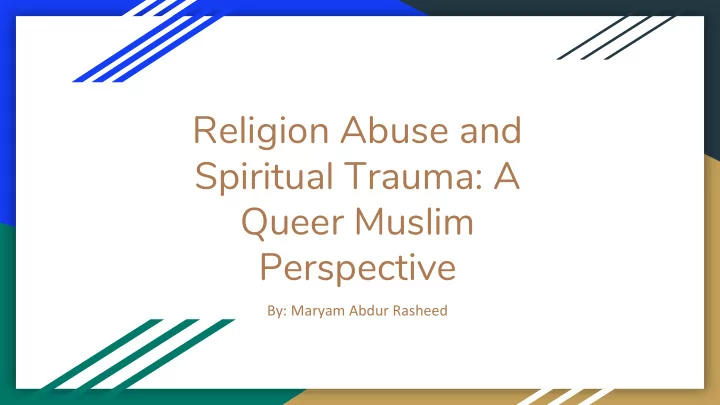

Religion Abuse and Spiritual Trauma: A Queer Muslim Perspective By: Maryam Abdur Rasheed
The Leadership Scholars Certificate Program is a two-year selective, interdisciplinary certificate program that prepares Rutgers undergraduate women to be informed, innovative, and socially responsible leaders. Leadership Scholars design and implement social action projects to expand their understanding of issues and problems and to develop leadership skills. This project gives Scholars the opportunity to apply the theoretical knowledge they have gained about leadership, advocacy, and social change with the practical and experiential knowledge they have developed about a particular policy issue or problem through the field site placement. It also further develops leadership skills by giving undergraduates the opportunity to practice leadership through action. To find out more please visit the Institute for Women’s Leadership’s website at http://iwl.rutgers.edu.
What is the Social Issue? ● Main Focus: Homophobia within Muslim Communities ● Religion Abuse: “ using the power of position and teachings to oppress, coerce, and manipulate LGBTQ people through shaming, stigmatization, rejecting, outsing, exorcising, and ex- communicating” (Super & Jacobson, 2011) ● Spiritual Trauma: “essentially an experience of violation of the spiritual or ‘scared’ core in human beings, harm at the innermost level, by an external ‘social’ force” (Kurk, 2010) ● Marginalization: “It is history in a cycle of erasure and reconstruction. Our history forgotten and reinvented. A phoenix in an endless cycle of death and rebirth” (Lynn, 2017)
Reconciling Faith: A Conversation with Mahida Lynn
Theoretical Framework ● Transformative Media Creation: “begins with an intersectional analysis of linked systems of race, class, gender, sexuality, ability, and other axes of identity” ( Costanza-Chock et.al, 2017) ● Qualitative Feminist Knowledge Production: “identity negotiation processes point to areas where individuals feel conflict because of identity gaps, those places where their self-concepts and avowed identities conflict with others” ( Faulkner and Hecht , 2011) ● Intergenerational support and wisdom: “we have to fight to learn and learn from our elders” (Lynn, 2017)
Leadership Lessons ● Planning ● Collaboration ● Self-actualization ● Knowledge Production
Partners and Future Directions ● Mahdia Lynn - Masjid Al-Rabia ● Analysis of the Queer Black American Muslim experience ● Video blogs highlighting my personal story with navigating my different identities ● Interview with Samra Habib, the creator of “Just Allah and Me: A Queer Muslim Photo Project” ● Create and maintain a blog that caters to the needs of POC-LGBTQ Muslims ● Far future: Become a scholar of intersectional and inclusive Islamic knowledge and create spiritual spaces for marginalized Muslims
Bibliography Costanza-Chock, Sasha and Chris Schweidler. "Toward Transformative Media Organizing: LGBTQ and Two-Spirit Media Work in the United States." Media, Culture & Society, vol. 39, no. 2, Mar. 2017, pp. 159-184. EBSCOhost, doi:10.1177/0163443716674360. Siraj, Asifa. "Alternative Realities: Queer Muslims and the Qur’an." Theology & Sexuality: The Journal of the Institute for t he Study of Christianity & Sexuality, vol. 22, no. 1/2, Jan- May2016, pp. 89-101. EBSCOhost, doi:10.1080/13558358.2017.1296690. Sirag Asifa. “’I Don’t Want to Taint the Name of Islam”: The Influence of Religion on the Lives of Muslim Lesbians.” Journal of Lesbian Studies, vol. 16, no. 4, Oct-Dec2012 pp. 449- 467. EBSCOhost, doi: 10.1080/10894160.2012.681268. Yip, Andrew. “Researching Lesbian, Gay, and Bisexual Christians and Muslims: Some Thematic Reflections.” Sociological Resear ch Online 13(1)5 http://www.socresonline.org.uk/13/1/5.html doi:10.5153/sro.1660 Faulkner, Sandra L. and Michael L. Hecht. “The Negotiation of Closetable Identities: A Narrative Analysis of Lesbian, Gay, Bi sex ual, Transgendered Queer Jewish Identity.” Journal of Social & Personal Relationships 28.6 (2011): 829-847. Print.
Recommend
More recommend